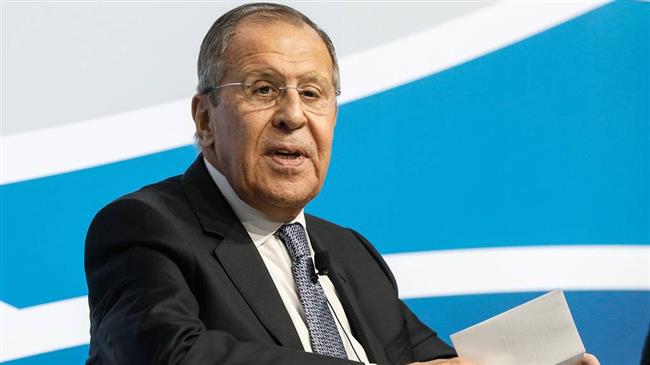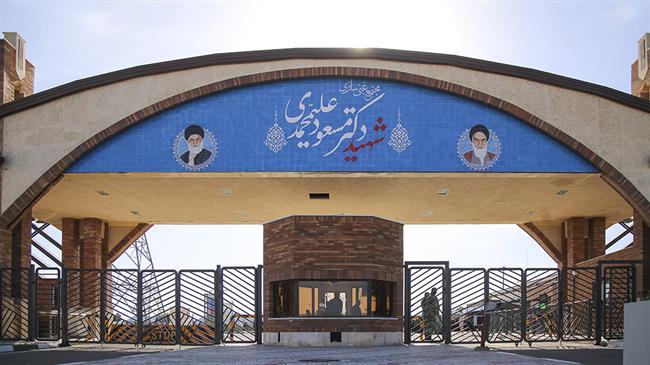Iran problems largely emanate from illegal US sanctions: Russia
Russian Foreign Minister Sergei Lavrov has blamed the recent turmoil in Iran mainly on the illegal sanctions the US imposed on the Islamic Republic after unilaterally withdrawing from the 2015 nuclear deal.
"Problems in Iran are very serious, to a large extent because of the US sanctions that were imposed on that country absolutely illegally, because the Americans withdrew from the Iran nuclear deal and are seeking to make others implement it," he told the Mediterranean Dialogues (MED) conference in Rome on Friday.
Lavrov also noted that the US scheme, which is meant to provoke public disconnect in Iran, was also used in Venezuela.
"If the US wants to stifle Iran economically and instigate people’s discontent, we see such a scheme being used in Venezuela. It is a pattern."
In May 2018, the US scrapped the Joint Comprehensive Plan of Action (JCPOA) that had been endorsed by the UN Security Council Resolution 2231.
Since then, the administration of US President Donald Trump has unleashed the “toughest ever” sanctions against Tehran, notably targeting its key oil exports.
In mid-November, the Iranian government rationed fuel in order to prevent the country from becoming reliant on gasoline imports in the future amid the US economic sanctions.
The move prompted protests in a number of cities that went largely peaceful, but turned violent when armed riotous elements took advantage of the situation to vandalize public and state property, and attack civilians and security forces alike.
Many of the rioters were found to have links to the US spy agency CIA as well as terrorist groups, royalists and separatists.
Russia vows to complete Fordow reconfiguration
Also on Friday, Russia vowed it would complete an ongoing project aimed at modernizing Iran’s Fordow enrichment facility, which has been suspended.
"We are taking a break now. We don’t abandon the project. It will be fully implemented," Russian Deputy Foreign Minister Sergey Ryabkov said.
Moscow, he added, needs time to react to the new circumstances at Fordow caused by the US decision to cancel a sanctions waiver for the plant as well as Iran’s injection of gas into centrifuges at the nuclear facility.
During a recent JCPOA meeting, Russia "stressed that gas injection to the [centrifuges’] cascades, which are located in the same premises where the works on reconfiguration for the production of stable isotopes are to be conducted, has somewhat hampered the original plan of reconfiguration. We will need time to assess the consequences and, probably, elaborate some technological solutions and it will inevitably mean some delays," Ryabkov said.
In November, Secretary of State Mike Pompeo said a sanctions waiver, which allowed Russian, Chinese and European companies to work at Fordow, will be eliminated on December 15.
The announcement came a few days after Iran began injecting uranium hexafluoride (UF6) gas into centrifuges at the Fordow plant, where 1,044 centrifuges are installed, as part of its fourth step away from the JCPOA under the supervision of the International Atomic Energy Agency (IAEA).
The Islamic Republic took the steps based on Articles 26 and 36 of the deal in reciprocation for Washington’s pullout from the JCPOA and Europe’s failure to meet its end of the bargain.
China slams US as ‘war-addicted’ threat to global security
China ‘firmly opposes’ US military aid to Taiwan
VIDEO | Press TV's News Headlines
President Yoon Suk Yeol to be removed from office
At least 19 Gazans killed by Israeli airstrikes since dawn: Medics
Leader: Iran neither has nor needs proxy forces
US fighter aircraft shot down ‘in friendly fire’ amid aggression on Yemen
Yemeni FM: Israel’s sponsors accountable for ongoing aggression on Sana’a
















 This makes it easy to access the Press TV website
This makes it easy to access the Press TV website